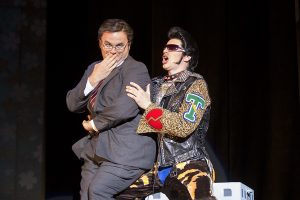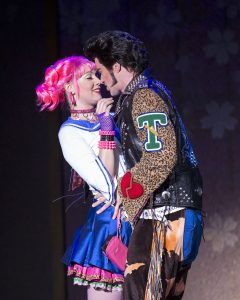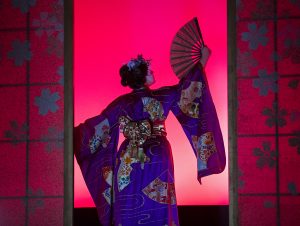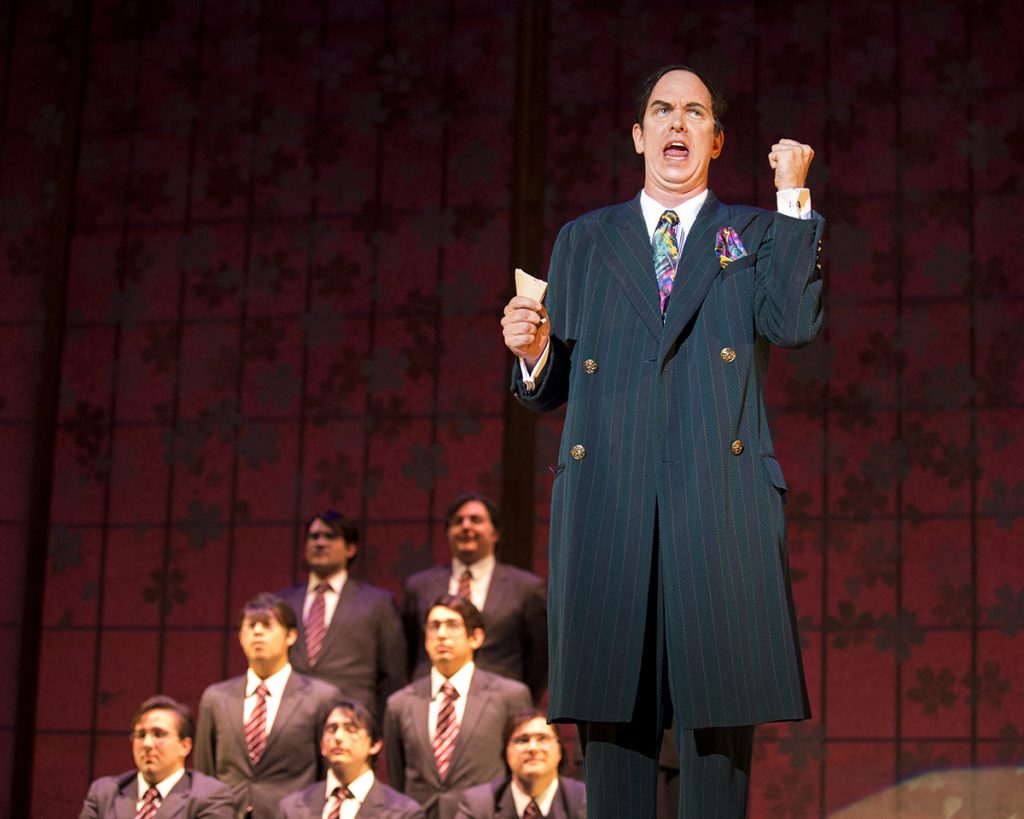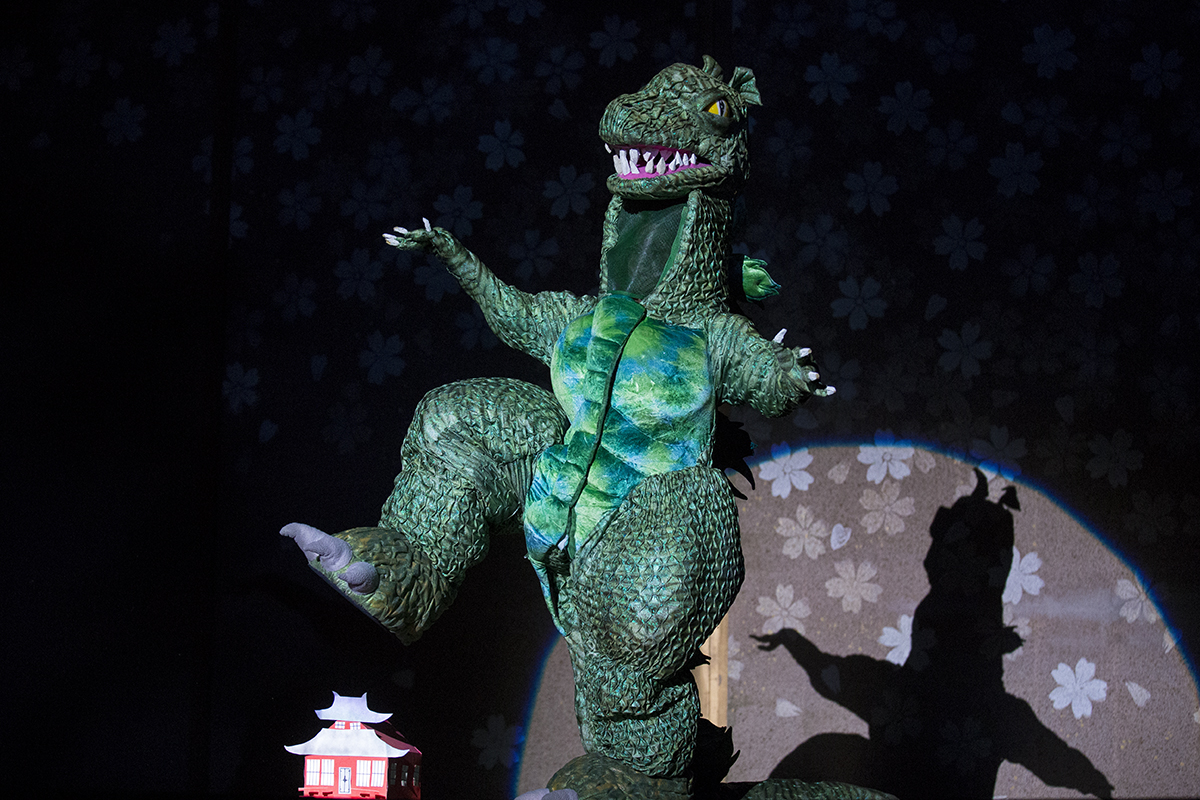Hello Kitty, Elvis and Godzilla walk into a bar.
The punchline is Ned Canty’s off the wall production of Gilbert and Sullivan’s The Mikado, presented by Chautauqua Opera Company at 7:30 p.m. July 29 and Monday in Norton Hall.
“[This opera] was a hit in a way that is difficult to comprehend today,” Canty said. “ ‘Star Wars’ is the only pop cultural influence I can think of that has the same kind of across-the-board influence.”
The work has maintained its popularity into the 21st century as the most performed of 13 surviving Gilbert and Sullivan comic operas, but that contemporary success carries a troubling history of yellowface, or the use of makeup and/or clothing by a non-Asian person in order to appear Asian.
The story takes place in the fictional Japanese town of Titipu and revolves around an emperor and his rebellious, lovestruck son. The subject matter, however, is fundamentally British.
In the same way the 1970s television show “M*A*S*H” allowed CBS to criticize the Vietnam War in the subtext of the Korean War, The Mikado allowed Gilbert to criticize the British government, the royal family and the class system with far more latitude than a continental setting would’ve afforded.
“[Gilbert] wasn’t interested in parody. He was interested in satire,” Canty said. “He wasn’t interested in getting cheap laughs from, ‘Look how silly they look in their kimonos.’ He was interested in saying, ‘Isn’t it funny that this bureaucrat could exist in Kyoto or in London and have the same flaws?’ ”
When the production premiered at the Savoy Theatre in 1885, European interest in the customs and culture of Japan was at a peak following the contentious 1854 opening of the island’s port cities to Western nations. For contemporary sensibilities, the Orientalist portrayal of an imaginary Japan no longer flies, and the character names are still problematic (Nanki-Poo, Pooh-Bah and Yum-Yum for example), but the desire to preserve the work as a musical treasure remains.
In 2014, the Seattle Gilbert & Sullivan Society came under fire for their traditional staging of The Mikado, and in 2015 the New York Gilbert & Sullivan Players canceled their production after wide backlash over their kimono-clad white actors and Orientalist staging.
Enter Hello Kitty, Elvis and Godzilla.
Canty began work on his production for Opera Theatre of St. Louis in 2005. He drew inspiration from the Japanese pop culture he had consumed as a child and loved as an adult, including video games like “Final Fantasy X,” but the spark of the idea was the Sept. 11, 1964, LIFE magazine cover with the image of a Geisha playing tenpin bowling.
That led to a slew of Google searches and the discovery of the Tokyo Rockabilly Club.
“This is a group of guys in Tokyo in Harajuku square who get together and dress in a sort of cross between Elvis and the Fonz and 1950s greasers,” Canty said. “They play rockabilly music, but then they break dance. And so they take these elements of American popular culture that we would consider very disparate, and they put them through a blender and they enjoy them.”
Canty’s goal for the production was to celebrate what he described as a cross-cultural pingpong match between American and Japanese pop culture, including Hollywood’s “Godzilla,” Kurosawa’s western “Seven Samurai,” Pokémon, Elvis and the global empire of Hello Kitty.
“If you drive down to Wegmans, there are guys making sushi in a supermarket in rural New York,” Canty said. “That’s mind-boggling, the extent to which we have embraced this culture.”
Opera Memphis mounted the Canty production in 2014 in partnership with the Japan-America Society of Tennessee and hosted a Japanese cultural festival with a traditional tea ceremony, Kendo demonstrations, calligraphy lessons and performance excerpts from current Japanese opera.
Canty isn’t the first director to place The Mikado in a new setting. In 1986, Jonathan Miller directed a new production with English National Opera, which removed any semblance of a Japanese setting and replaced it with transparently British characters in a 1920s hotel lobby.
“It was interesting to see how most of the jokes, the actual jokes, are about British strata and the sort of convoluted way a British law can be written,” said Kevin Burdette, who sang the role of Pish-Tush in a staging of the Miller production. “It’s a very British style of comedy, sort of poking fun at itself.”
Burdette, a baritone, will play Ko-Ko in tonight’s performance. He described his character as the apex of shameless comedy and humanity.
“I love playing sort of funnier roles that aren’t on their face necessarily the most sympathetic, which allows for a certain amount of play that is just exhilarating,” Burdette said. “It’s a lot of fun. I like to make people laugh, and Gilbert and Sullivan wrote a character in Ko-Ko that makes people laugh.”
Daniel Belcher will play the role of Pooh-Bah, an overworked appointee of the emperor and sidekick and comedic foil to Ko-Ko. He described his character as a panic attack waiting to happen.
“He’s doing about 100 jobs at once and he might think he’s doing them all well, but you know, it’s debatable whether he’s doing any of them well,” Belcher said. “He’s a complete joy, so I’m trying to find the loveable side in him as we explore the manic panic.”
This is the first time Belcher and Burdette are working together, but they’ve known each other for years and both praised the work of the Young Artists, eight of whom will sing lead roles.
“Because of all this youth, there’s this wonderful youthful exuberance that is just contagious,” Belcher said. “The opera is just complete joy, and I really [challenge] anyone to leave the theater without a smile on their face.”
